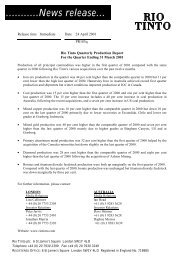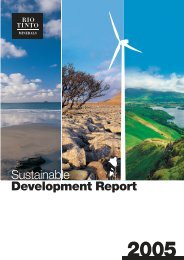Luzenac - Rio Tinto
Luzenac - Rio Tinto
Luzenac - Rio Tinto
Create successful ePaper yourself
Turn your PDF publications into a flip-book with our unique Google optimized e-Paper software.
In 2002, our Rodoretto mine in Italy<br />
installed a guided man-hoisting system<br />
in its ventilation and emergency egress<br />
shaft. The system enables the quick<br />
evacuation of injured people.<br />
In 2002, <strong>Luzenac</strong> Inc., based in Ontario,<br />
Canada, won an award of excellence for<br />
safety from the Mines Aggregate Safety and<br />
Health Association, as a a result of having<br />
the lowest lost-time and medical aid<br />
frequencies of member firms in Ontario.<br />
In 2003,we are continuing to<br />
strive for lower accident rates companywide,<br />
and have set a target of less than<br />
0.65 LTIFR for the <strong>Luzenac</strong> Group as a<br />
whole. Part of our preparation to meet<br />
this target has been the achievement,<br />
mostly in 2002, of compliance to a strict<br />
safety standard, which is now common<br />
throughout the <strong>Rio</strong> <strong>Tinto</strong> Group. We are<br />
dedicated to the proposition that, in the<br />
mining industry, everyone should be able<br />
to go home after a day’s work in the same<br />
physical condition as they were when<br />
they arrived.<br />
6<br />
acquiring self-knowledge of their strengths and<br />
improvement areas, followed by an individual<br />
career discussion;<br />
• Quarterly HR reviews both within <strong>Luzenac</strong>, with<br />
other <strong>Rio</strong> <strong>Tinto</strong> companies and with <strong>Rio</strong> <strong>Tinto</strong> HQ<br />
on management and professional development of<br />
our talent pool;<br />
• A policy of internal notification of vacancies and<br />
internal sourcing of personnel prior to external<br />
recruitment, and a job vacancy section on our corporate<br />
website;<br />
• Externally run sessions for selected participants<br />
to identify competencies and career orientations.<br />
In the event of a site closure, transferable skills<br />
increase the person’s marketability and open larger<br />
sectors of the job market to them. This means they<br />
are equipped to look for jobs and identify alternative<br />
occupations outside <strong>Luzenac</strong> or our industry.<br />
<strong>Luzenac</strong> considers that the acquisition of transferable<br />
skills opens up career opportunities and<br />
enhances personal motivation both within and outside<br />
the group, and will continue efforts to encourage<br />
competency development.<br />
Safety - our number one priority<br />
Safety in all aspects of our work is our first priority.<br />
This not only applies to our mines and plants, but to<br />
people performing technical service work at the customer’s<br />
plant, sales people driving to see customers,<br />
and our lab and office staff. We encourage people to<br />
be safety conscious in their life outside of work too.<br />
In 2002, one of our Australian colleagues was tragically<br />
killed in a car accident while on a<br />
technical visit to our operations in<br />
Montana, USA. He was driving at the<br />
end of the workday from the mine to the<br />
hotel. His passenger, from the same<br />
Australian operation, narrowly escaped death. The<br />
official investigation showed there was no fault with<br />
our colleague’s actions or with our travel policy and<br />
practice, and that the fault lay with the driver of the<br />
other vehicle. Nevertheless, we have completely<br />
overhauled our whole system of foreign travel to take<br />
this tragic event and other possible scenarios into<br />
account.<br />
In last year’s social and environment report (webbased<br />
only), we reported that our 2002 target for<br />
reduction of Lost Time Injuries (LTI) was a frequency<br />
rate of less than 0.7. We failed to meet this. The<br />
result was 0.9, virtually unchanged from the previous<br />
year.<br />
However this bald statistic disguises five real<br />
advances in our safety performance:<br />
• The severity of the accidents, measured by the<br />
number of shifts lost, was halved across the Group<br />
and was cut by factor 10 in Europe.<br />
• Several of our operations reported zero accidents<br />
in the year. These include Spain, Italy, UK, Mexico<br />
and Texas, USA. Our Spanish operations (a total<br />
of five locations) have now gone almost seven<br />
years without a single LTI.<br />
• At 0.63, our European operations (22 locations)<br />
had their lowest accident frequency rate on record.<br />
• Our Yellowstone mine was awarded the prestigious<br />
<strong>Rio</strong> <strong>Tinto</strong> Chief Executive Safety Award for<br />
12 years without an LTI (see opposite).<br />
• Following a terrible accident in 2001 in which a<br />
colleague lost fingers in a screw conveyor, we systematically<br />
modified equipment and procedures<br />
across the Group so that moving parts are inaccessible<br />
when a machine is running.<br />
Our approach to safety continues to be focused on<br />
improving behaviour. This goes hand in hand with<br />
improving equipment and working conditions.■


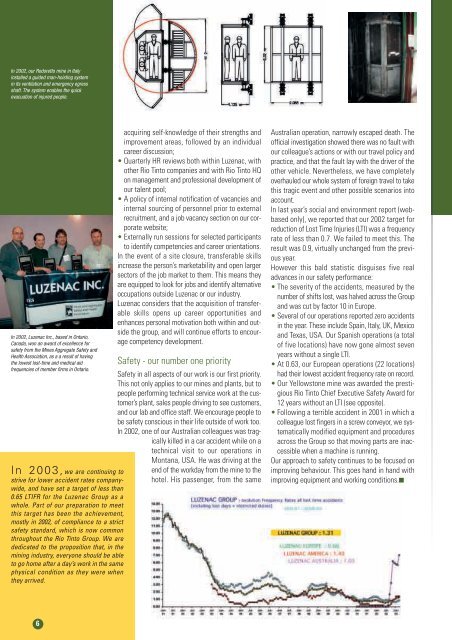
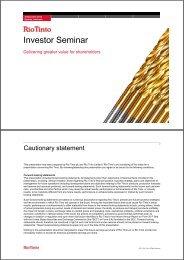
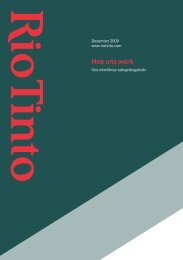
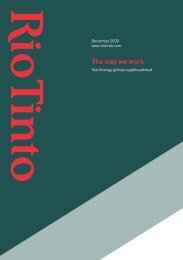


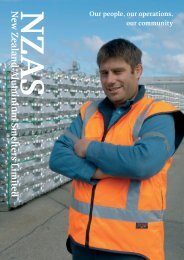
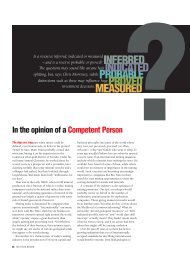
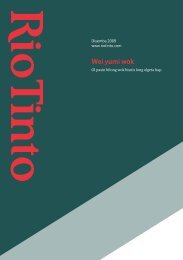

![Download pdf file [PDF: 1.26 MB] - Rio Tinto](https://img.yumpu.com/10319684/1/190x253/download-pdf-file-pdf-126-mb-rio-tinto.jpg?quality=85)

